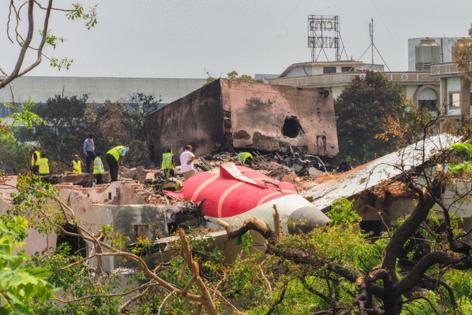Air India families sue Boeing, claim flaws brought down 787
Published in News & Features
The families of four people killed when a Boeing 787 plane crashed in Ahmedabad, India, in June have sued the airplane manufacturer and supplier Honeywell International.
The lawsuit, filed earlier in the week in Delaware Superior Court, accused both companies of negligently manufacturing and installing a defective product. The allegations focus on the plane's engine fuel control switches, two switches that have been the center of the accident investigation.
It appears to be the first lawsuit filed in the United States since the fatal crash June 12.
The crash, involving an Air India 787, is still under investigation, but a preliminary report from India’s Civil Aviation Authority indicates crucial switches that supply fuel to the engine were moved from the “run” to the “cutoff” position seconds after takeoff.
The switches were flipped back moments later, but the engines were unable to restart, and the plane crashed into a nearby medical hostel, killing 241 of the 242 people on board and 19 people on the ground.
It’s not clear how or why the engine fuel switches moved. Data from the cockpit voice recorder revealed one pilot asked the other why he moved the switches, cutting power to the engines. The answering pilot responded that he did not do so.
India’s Aircraft Accident Investigation Bureau and the U.S. National Transportation Safety Board, which is assisting in the investigation, warned against speculation while the investigation is ongoing. The pilots' unions cautioned against blaming those flying the plane.
In the preliminary report, investigators said there were no recommended actions for Boeing’s 787 fleet or the General Electric engines that powered the plane. An inspection of the engine fuel control switches on Air India’s Boeing fleet did not find any problems, according to the airline.
The lawsuit, filed Tuesday, alleges Boeing and Honeywell, which makes the engine fuel control switches, installed “faulty” switches that did not have the right safeguards to prevent a pilot from accidentally moving them. Furthermore, the switches were in a “high-traffic” area that increased the risk of an “unintended” move that cut fuel to the engines, the lawsuit alleges.
Aviation safety experts and former accident investigators who spoke to The Seattle Times in the weeks following the crash said it would be difficult for pilots to accidentally move the switches. It requires a multistep process, pulling the switch up and over, and the switches are protected by metal barriers.
Shortly after the crash, a Federal Aviation Administration notice regarding the engine fuel cutoff switches from 2018 began to recirculate.
The FAA said it had received reports that some of those switches were installed with the locking feature disengaged, meaning it could be easier for pilots to accidentally move the switches and inadvertently cut power to the engines.
The FAA said at the time the reports did not pose a safety risk. It recommended airlines inspect the locking feature but did not require those inspections.
In July, after the Air India preliminary report was released, the FAA reiterated that the 2018 reports did not pose a safety risk.
FAA administrator Bryan Bedford told reporters at a Wisconsin Air Show that month there didn’t “appear to be a mechanical issue with the Boeing fuel control unit,” according to Reuters. “We feel very comfortable that this isn’t an issue with inadvertent manipulation of fuel control.”
According to the preliminary accident report, Air India had not inspected the engine fuel control switches on its planes after the FAA’s 2018 notice because the bulletin was “advisory and not mandatory.”
The airline replaced the throttle control module, which includes the engine fuel control switches, involved in the accident in 2019 and 2023, for reasons unrelated to the locking feature.
Boeing declined to comment on the lawsuit, citing international rules that prevent parties from discussing an open aviation investigation. Honeywell could not be reached for comment.
The lawsuit seeks compensation for the wrongful deaths of four passengers, according to the Lanier law firm representing the families.
“The families deserve justice and they deserve to know what happened,” attorney Benjamin Major said in a statement.
© 2025 The Seattle Times. Visit www.seattletimes.com. Distributed by Tribune Content Agency, LLC.







Comments